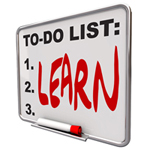 Do you ever think about your “learning objectives” when you have a new project or when confronted with challenging situations at work? Do you ever assess/reflect what you learned after? This is a practice I’ve come to embrace not only to model what I expect from my students in my role as an educator, but it has also provided me a better perspective in how I approach my work. In adopting a learner’s mentality, I have come to view mistakes as learning opportunities and that learning doesn’t happen in a sequential timeline, but rather it involves some detours and challenges along the way. This has allowed me to be more patient, not only to myself, but to my colleagues as well. Adopting a learner’s mentality encourages me to be resilient during moments of frustrations. The thought of “what can I learn from this?” often changes how I view a situation. I have come to believe in the concept of constructivism – the idea that learning is social and collaborative. As important, having a learner’s mentality provides me with the mindset to look forward and not stagnate when it comes to personal and professional development.
Do you ever think about your “learning objectives” when you have a new project or when confronted with challenging situations at work? Do you ever assess/reflect what you learned after? This is a practice I’ve come to embrace not only to model what I expect from my students in my role as an educator, but it has also provided me a better perspective in how I approach my work. In adopting a learner’s mentality, I have come to view mistakes as learning opportunities and that learning doesn’t happen in a sequential timeline, but rather it involves some detours and challenges along the way. This has allowed me to be more patient, not only to myself, but to my colleagues as well. Adopting a learner’s mentality encourages me to be resilient during moments of frustrations. The thought of “what can I learn from this?” often changes how I view a situation. I have come to believe in the concept of constructivism – the idea that learning is social and collaborative. As important, having a learner’s mentality provides me with the mindset to look forward and not stagnate when it comes to personal and professional development.
Some time along my professional life working at the university, I forgot I work at a learning institution. I somehow forgot that learning does not stop after college. I approached my work completing tasks and projects without really thinking about how and what I should be learning along the way. I was not intentional about what I needed to learn for my own professional development. The fact that I rarely went to conferences for training kept me in the mindset that I was limited in my learning opportunities and I needed to depend on my supervisor for resources for these opportunities. This attitude changed when I was introduced to the concept of “alternative professional development” which is the idea that learning can happen outside formal training opportunities. Through social media and personal learning networks, I realized I could learn on my own. For years, I thought the only way to learn about student affairs theories and history was through graduate programs. I realized that was not the case. I realized I can create and shape my long term learning opportunities. I’ve adopted this learner’s mentality at work.
How do you approach learning at work?
Image credit: http://www.marksanborn.com/blog/4-learning-priorities-for-the-new-year/
May 6th, 2013 on 7:26 am
You had me at learning objectives my friend. What an important reminder that we are, and need to be, learning right along with our students. We must be in the business of continuous learning as the only true constant really is change, whether that means our students, how we do our work or what our priorities at work are. That model of learning and also seeking opportunities for development and growth is also so important for our colleagues and our students – meaning we must also be lifelong teachers sharing our knowledge with others for the great goal of student success.
May 7th, 2013 on 8:26 pm
Thanks Lisa! You have a way with words my friend. You always capture the essence of what I’m trying to say in a more meaningful way. I truly mean this.